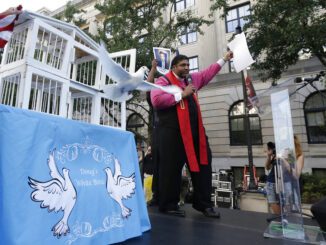RALEIGH — For North Carolina teachers and parents with school-aged children, lack of official guidance from the state on how districts should proceed for the 2020-21 school year, now only weeks away, is leading some to begin making decisions irrespective of word from above.
In early June, Gov. Roy Cooper had directed school districts to come up with three plans: one if learning were to take place solely on campus, one if learning were going to be done remotely, and another if schools were allowed to welcome students back to campus, but at reduced capacity and with greater social distancing.
Cooper said that after schools organized these plans, he would make an announcement July 1 to recommend which of these three options the state would direct schools to use. But on July 1, Cooper instead announced there would be no announcement on the subject, saying simply, “We’re not issuing a statewide directive today on how schools should open in the fall, but we will soon.”
An Elon University Poll, released on July 1 as well, showed N.C. residents fairly evenly split between the three options, with the smallest segment being in favor of a purely online plan. With the ongoing COVID-19 pandemic, many see remote learning as the safest option, but the poll showed only 29% wanted this completely remote return, while 34% wanted a full-time on-site return, and 38% called for a mix of the two.
Cooper’s office indicated it needed more time to review data and to consult on the matter. The governor’s comments during the press conference suggest he agrees with the majority in the poll, who want some level of in-person learning.
“Let me be clear: We want our schools open for in-person instruction in August,” Cooper said at last Wednesday’s press conference. “The classroom is the best place for children to learn — recent reports recommend it, and I know many parents and children agree.”
Senate Bill 704, a bipartisan omnibus bill to deal with many areas of government response to the pandemic, requires schools to open Aug. 17, a week earlier than is typical. This earlier start puts additional pressure on schools to prepare, and many are beginning to move ahead with plans separate from the governor’s timeline.
The Wake County School Board voted unanimously on July 2 to move forward with the mixed plan. According to Wake County Public School System Superintendent Cathy Moore, the plan will be more difficult to implement than the fully on-campus or fully remote learning plans, and it requires students to rotate in and out of in-person classes over a three-week period, with two-thirds of students always at home.
Two Wake County teachers, speaking to NSJ on the condition of anonymity, approved of the school system’s decisiveness.
One teacher told NSJ that the fact that the county had at least picked one of the three plans helped to bring teachers some clarity, “although we know things might change when the governor makes a decision.”
A second said the plan that’s being put in place this year for the county, which includes some face-to-face time, will allow for more accountability than what was in place at the end of last school year, saying it “inspires more confidence than the prospect of strictly remote learning for the foreseeable future.”
Some parents aren’t waiting to see which of the options will be selected and are instead taking matters into their own hands. On July 1, the same day that the governor announced his decision would be delayed, the government website where parents give notice of their intent to home-school crashed due to volume.
At 9:20 p.m. that night, the site simply read, “The system is not currently available due to an overwhelming submission of Notices of Intent (NOI). It will be back online as soon as possible. We apologize for any inconvenience as we work to process NOIs as quickly as possible.”
Classical Conversations Inc. CEO Robert Bortins, whose Southern Pines-based company is one of the largest home-school curriculum providers in the world, was not surprised more parents are interested in home-schooling.
“Families are uncertain if the public schools will be able to serve their needs for school this fall,” Bortins told NSJ. “The pandemic schooling at home gave them the opportunity to see that they could homeschool, and now they are choosing to do it intentionally.”
NSJ asked N.C.’s Department of Administration for details on what occurred with the site crash and how many notices of intent to homeschool they received that day. Despite the message indicating an “overwhelming submission” of NOIs, spokesperson Aldesha Gore blamed site maintenance, saying, “Site users are experiencing real-time maintenance that need [sic] to occur.”
In a sign that Cooper’s political opponents are moving to make the delay a campaign issue in his reelection, N.C. Republican Party Chairman Michael Whatley released a statement saying, “North Carolina families need to know if their kids will be in school next month. Unfortunately, despite being Gov. Cooper’s self-proclaimed top priority, he still cannot deliver a plan for reopening our schools.”


